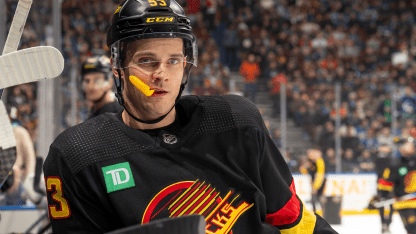No team is ever the same in the NHL.
Each season, you have playoff contenders, mediocre clubs, draft lottery hopefuls, and a single Stanley Cup Champion.
Over the years, there are certainly similarities in the upper echelon of teams in this league. Winning organizations know their style of play, and they execute it well. Teammates work together and from speaking to some former Stanley Cup Champions, you will see a trend.
Both Teddy Blueger and Rick Tocchet can tell you firsthand how Stanley Cup-winning teams have lineups where players know their role, the goal in that role, and have confidence that each player can accomplish their role’s goal.
Another topic that was brought up was the way that a team ‘feels’ going into the postseason.
Last year’s Stanley Cup Champion Vegas Golden Knights had just one regulation loss in the final 12 games of the regular season. That was a huge catalyst heading into the playoffs for the Knights and something that Blueger credited for his team’s postseason success.
“Last year, a big thing was that we were playing really well going into the playoffs,” said Blueger. “Everyone being on the same page and doing their job while carrying good momentum. That is something that, with six games left, we are going to focus on and do going forward here.”
“It came down to everyone embracing their role and knowing exactly what is best for them and the team. It took commitment to do that and then we had to execute well."
Blueger had 18 games of NHL playoff experience before last season and though he did not feel surprised by anything during Vegas’ cup run, he thought that his lack of experience did not matter as much because the room was so locked in and knew what needed to be done to accomplish their goals.
The room was loose in Vegas, but the players knew when it was time to focus. Blueger talks a lot about execution and how different players in the lineup can provide a spark that changes a game, or a series.
“The fourth line checked really well, the top guys were scoring, the goalies were playing great, and all the guys were defending hard," said Blueger. "Once it clicks, you need to continue to generate positive momentum. From there, it comes down to a couple of moments and those moments decide series.”
It was not just the momentum in the room that helped the Knights last season. Blueger believes the buzz in and around the city motivated the players every day. That positive environment kept the group focused on the goal.
Many of the Canucks’ players are already excited for that type of boost from the city of Vancouver.
“This is a passionate fan base,” said J.T. Miller. “We would not want that any other way. It's a fun time here not just for us but for the fans in the city. They haven't had that in a while here and it's going to be a fun time. It is a much-anticipated time for all of us.”
Enthusiasm and energy are great. It is something that all playoff teams have talked about at some point during the season, but that feeling also needs to be managed correctly.
That is the goal of head coach Rick Tocchet.
As the Canucks approach the playoffs, Tocchet wants to see his team cement their play with the staples and structure that he has preached about all season long. The coach is speaking about passion, work ethic, and how to handle pressure or adversity.
It’s lessons that he and his coaching staff have learned over their years in the NHL.
As much as there has been a build-up all season long, Tocchet is still looking for consistency. There is a level where he wants this group to get to and it entails on-ice action with off-ice commitment.
“The playoffs are when everything's amped up even more,” said Tocchet. “Line changes must be dead on, and shots must be blocked. Sometimes, you might have to get the puck in deep in a situation where maybe in the past, you tried to make a play. This is the time when you really have to get the puck in deep. Good teams find a way to be dialed in. Listen, it is hard to be this intense for 82 games. But with less than a few weeks left in the season, you have to raise it up and stay up there for the final stretch.”
The ramp-up to the playoffs is a real thing, especially with a team that leans heavily on its system and structure. Blueger and Tocchet spoke about less and less time to correct mistakes in the playoffs and we have heard Tocchet speak a lot about his want for the Canucks to be able to avoid compounding mistakes.
Losses are viewed much differently at this point in the season because the group has grown their game and built up the way they want to play.
“We’ve got six games left so we need to make sure we are dialed in, and the intensity level ramps up as well as our attention to detail,” said Blueger. “I think back to the way we played running through the road trip in California and Vegas – we were very good defensively and that’s the hockey we’re going to need to play in the playoffs.”
Blueger views the corrections as important as the mistakes at this point in the year. You want to be able to correct a mistake and not duplicate it but his experience in playoff hockey and being on last year’s cup champion team has taught him that identifying what needs to be addressed is as important as the fix for the problem.
The 29-year-old Latvian has been a trusted defensive centre throughout his career but can also help create some things offensively. He has been on the ice for 373 scoring chances and only 297 against at five-on-five this campaign.



















